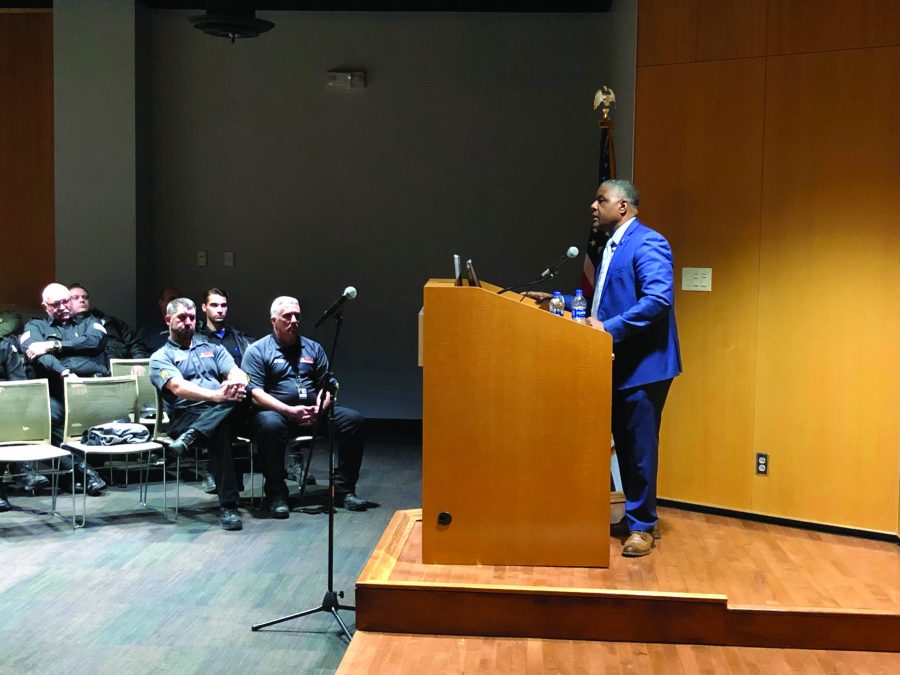One month after a confrontation between Campus Safety officers and students in Strebel, Retired Syracuse Police Chief Rick Fowler facilitated a wide-ranging discussion between students, faculty, Utica College administrators and Campus Safety officers on Monday, April 1, in the Carbone Family Auditorium.
The event, originally announced by President Laura Casamento in a campus-wide email, was intended to be a first step in an effort to “move forward together” by providing an opportunity to openly discuss Campus Safety’s role as a law enforcement body at UC after relationships between safety officers, students and administrators were strained from the March 1 Strebel incident.
Fowler, who served as deputy chief of community relations before being named chief of the Syracuse Police Department, explained that the tensions and misunderstandings between Campus Safety and students are not unique to Utica College. The first step to mending this relationship, he explained, is by creating an atmosphere where students can both voice their concerns over issues like racial bias in policing and be heard.
“Law enforcement are service providers, and if our students are our clients, then we have an obligation to learn from them,” Fowler said. “Anyone in a position of authority, public safety or uniformed services automatically assumes an authoritative role. People want to know that they have a voice beyond policy or the black-and-white letter of the law.”
As the discussion concluded, Fowler proposed forming a student liaison group that could act as an intermediary between the Office of Campus Safety and the student body as a whole. Similar student-led groups at Syracuse University, he explained, have had success improving the relationship between campus police officers and students.
“I think having a group of young folks that is going to advise [Campus Safety] on issues like this will go a long way to (A) help [Campus Safety] to be more efficient in providing that service (public safety) and (B) let those young folks know that they have a direct voice,” Fowler explained.
Speaking after the meeting, Casamento said that she liked the idea of a student-led committee that could facilitate discussions between students and Campus Safety. She also said she recognizes student demand for more “transparency” on safety policies and continued conversations on the broader role of race and race relations at Utica College.
“Our students want to see progress, they don’t want to see us going backward,” she said. “The more that we can show that we’re trying to move forward, I think the better off we’ll be.”
Director of Campus Safety Wayne Sullivan, who attended Monday’s discussion along with 10 Campus Safety officers, is also in favor of a student liaison group. But past efforts to form similar groups, he explained, have fallen short due to a lack of participation from the student body.
“Having students’ input on their feelings on why they do not feel safe is important to us,” he said. “Those liaison groups, I think, are the very best way to do that, but getting participation [from students] is the key to that.”
Casamento said that she has also begun speaking with students about the possibility of forming a “race and race relations” cabinet that she could meet with on a regular basis during the course of a semester.
“If I’m meeting with students on a monthly basis and Campus Safety is meeting with students on a monthly basis, it’s those groups who go out and say [to other students], ‘Here’s what’s happening,’” Casamento explained. “So it’s not the administration trying to communicate directly with students, it’s students communicating with students, and I think that kind of student involvement will be really important.”






































































































































